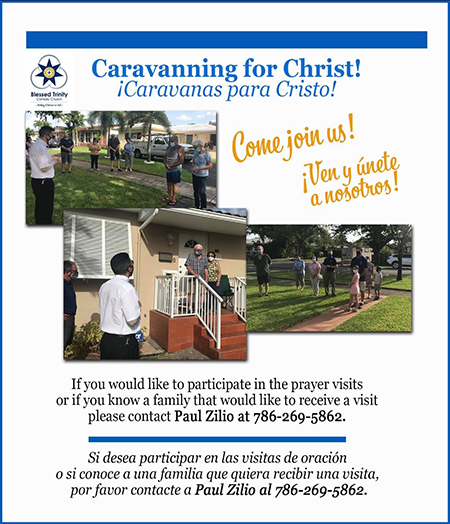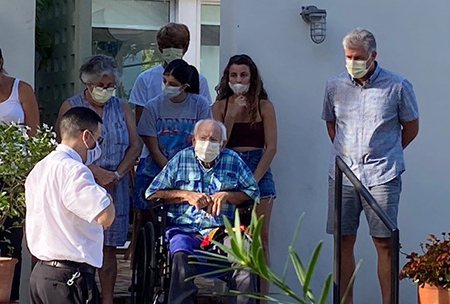By Jose Antonio Varela Vidal -
Months ago, a priest who was over 70 years old was reassigned to a parish that he loved, the one that had sheltered him since he was younger. He experienced the anticipation of those who return home to find their children grown up. However, in addition to assuming the role of pastor in a ceremony bereft of parishioners or a bishop to hand him the keys, he encountered the ravages of the COVID-19 pandemic — among them the closed, almost walled-up church.
In the meantime, he, like many, received the new document on the parishes drawn up by the Holy See, in which the terms "pastoral conversion" and "renewal of structures" penetrate not only the text, but pierce the heart of every pastor who claims the title.

Photographer: Courtesy
Blessed Trinity Church is inviting parishioners to participate in prayer visits to other parishioners homes. This initiative is a parish effort in line with the new document of the Holy See "The pastoral conversion of the parish community in the service of the evangelizing mission of the Church," published on June 29, 2020 by the Vatican's Congregation for the Clergy, calling for a "community discernment" that will lead them to renew their dynamism.
Renewing the parish
The document referenced above is the Instruction "The pastoral conversion of the parish community in the service of the evangelizing mission of the Church," published June 29, 2020 by the Vatican’s Congregation for the Clergy.
It is a clear teaching that, without ambiguity, calls for "renewing" the face of the Church. For this reason, it calls on bishops, pastors, consecrated persons, and the people of God to a " community discernment" that will lead them to renew their dynamism. To achieve this, "cultural changes and the evolving territorial ties" must be analyzed.
The text raises awareness that the parish is no longer "the primary gathering and social center" and that at times it is only the setting for "mere repetitive action that fails to have an impact upon people’s concrete lives" (and) a "bureaucratic organization of events and an offering of services."
In order to overcome this reality and reach new urgent goals, the instruction calls for diversification, fraternal and open alliances, and for the parish to become "a living sign of the proximity of Christ through fraternal bonds, ever attentive to new forms of poverty." This is better understood as the "culture of encounter," so dear to Pope Francis.
The instruction warns that this renewal must safeguard the centrality of the teaching of the Word of God, the celebration of the Eucharistic mystery and the witness of charity. It also calls for the process of Christian initiation to be an uninterrupted journey, with a catechesis that accompanies "the perpetual sequela Christi," the permanent following of Christ.
A change of mentality
The document warns that to avoid "trauma and hurt," the process of restructuring parish communities should be done with "flexibility and gradualism," not hastily; and neither must it be done using generic criteria "that obey a rational decision" or are imposed by the pastor.
To achieve this, the instruction calls for the pastor and parochial vicars to engage in a discernment that allows them to recognize the different vocations and ministries that God has given to the faithful, and thus assure them a space for participation.
As part of this proposed "pastoral conversion," emphasis is placed on the free services offered by the parish, which has "the need not to 'commercialize' the sacramental life," thus avoiding the impression that ministerial actions are "subject to tariffs."
Nevertheless, the text recognizes that the people of God must contribute responsibly to sustaining the needs of the Church. Therefore, the pastor is called to educate the faithful so that "each member of the community feels responsible and directly involved in caring for the needs of the Church in a variety of ways and in a spirit of solidarity," so that the Church can "carry out her pastoral service with freedom and efficacy." In this, the tithe, with its different modalities, proportions and realities, could give stability even in times of catastrophes, such as the current pandemic.
In order to create a climate of trust, the instruction also calls on priests to "offer virtuous examples in their use of money, whether it be that of a sober lifestyle, without excess on a personal level, or that of a transparent management of parish goods" in accordance to "the real needs of the faithful, especially the poor and needy."

Photographer: Courtesy
Father Jose Alfaro, pastor of Blessed Trinity Church in Miami Springs, along with several parishioners from his parish, visit a family to pray with them during the COVID-19 pandemic. Father Alfaro's efforts to reach parishioners is in concordance with the new document on the parishes drawn up by the Holy See.
Parish renewal ministers
With reference to the pastor, it is established from the beginning that he must be an ordained minister in the presbyterate. That is to say, neither a deacon, nor a religious, nor a lay person can exercise this function. It also refers to the parochial vicar or collaborator of the parish priest, to whom a specific sector of the pastoral ministry can be entrusted, such as the youth, the elderly, the sick, associations, guilds, formation, and catechesis, among others.
Permanent deacons are recognized as collaborators of the bishop and are therefore ordained by him for the service of the Word and the altar, as well as for the service of the poor and always in a specific parish.
The document of the Holy See recognizes the participation of consecrated persons and the laity as "a harmonious synthesis of charisms and vocations" in parish life. In the case of the former, it highlights their presence as an "integrated" way of participating in the parish community, which allows them to give "witness of a radical following of Christ." Following this, they can develop actions according to their own charism, such as catechesis, youth and the sick, as well as the exercise of charity.
The other invitation to consecrated and lay people is "to place themselves at the service of the parish community." Along with the task of catechists or extraordinary ministers of the Eucharist, lectors or acolytes may be instituted through a specific liturgical rite.
In addition, the bishop may entrust to the lay faithful certain tasks by way of exception, under the guidance of the pastor. We are talking about the celebration — in the absence of the priest — of a liturgy of the Word on Sundays and holy days of obligation, with preaching if necessary, as well as the administration of baptism, the celebration of the funeral rite and even assisting at marriages.
Taking care of the finances
Toward the end — and no less important — we read a series of clarifications about what are known as the "Parish Finance Council" and the "Parish Pastoral Council."
Regarding the first one, the text explains that its main function is "to administrate the goods of the Church," which do not belong to the parish priest and even less to the lay faithful. To this task is added the duty to fulfil "a role of particular importance in the growth, at the level of the parish community, of a culture of co-responsibility, of administrative transparency, and of service to the needs of the Church."
In the case of the pastoral council, the text ratifies its condition as a "consultative body," representative of the community, committed to it, and with the clear "right and duty to express their own thought concerning the good of the parish community to the pastors, and to communicate it to other members of the faithful."
Given that the pastoral council must seek and study practical proposals for pastoral and charitable initiatives related to the parish, the document warns that the pastor should not convene the council only to present "decisions already made, or without the required information beforehand."
All this, according to the Vatican instruction, will prevent the "historical parish institution" from being "a prisoner of immobility or of a worrisome pastoral repetition." To avoid this, and in harmony with Pope Francis, the parish must activate that "outgoing dynamism" proper to its evangelizing mission. There is no other option.


Comments from readers